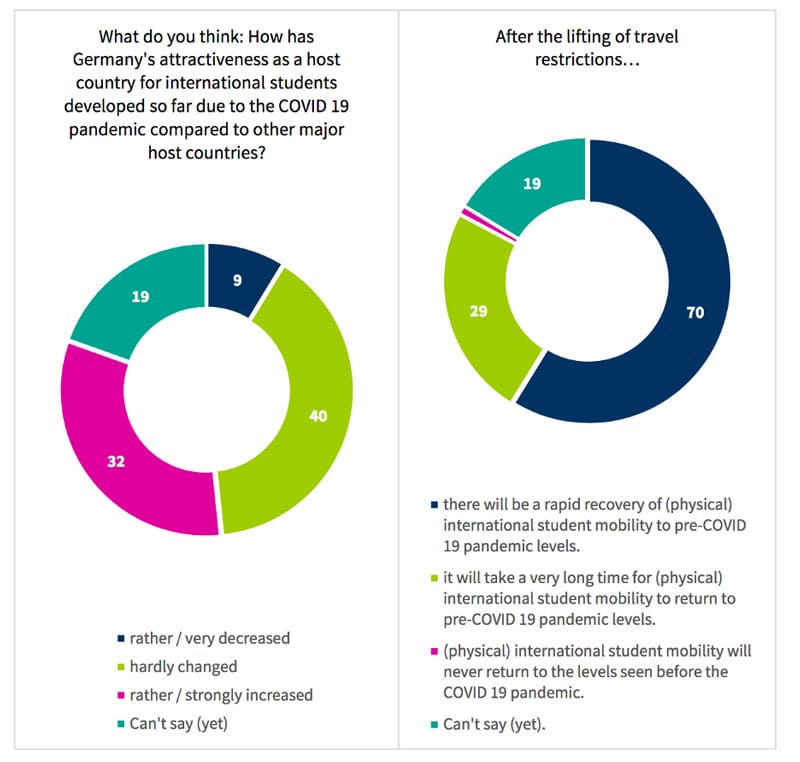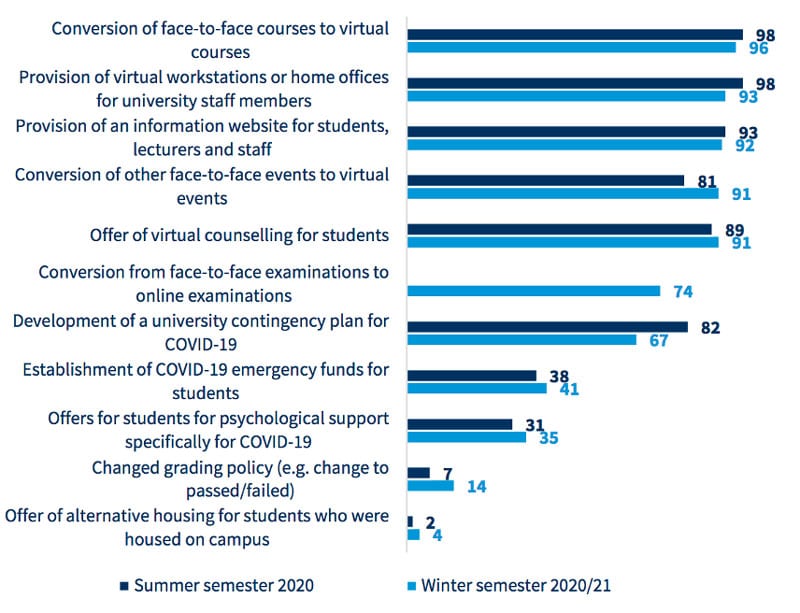German universities optimistic about internationalisation even during COVID
- A new survey of 171 German higher education institutions found that universities generally embraced digitalisation in the 2020/21 academic year and a significant number entered into new international partnerships to deliver programmes to international students
- Respondents indicated that up to half of new degree-seeking students were turned away from Germany because of visa issues
- But optimism abounds, with strong majorities believing both that internationalisation is going to be just as important – if not more – at their universities after COVID and that a quick recovery will happen once travel restrictions ease
Germany’s universities are optimistic about the future and pleased to have increased digital initiatives abroad during COVID, according to a new survey of staff at 171 higher education institutions by the German Academic Exchange Service (DAAD). The survey was carried out in February 2021.
Highlights from the findings include:
- Roughly half believe that that their university’s internationalisation will be minimally disrupted by the pandemic, and more than 20% think international links will become even more important after COVID.
- Almost three quarters expect that the end of travel restrictions will usher in a quick recovery in international student mobility.
- A third (32%) believe Germany’s attractiveness to international students has increased in the pandemic relative to other destinations, much higher than the 9% who think Germany has become less popular.
- Most German universities (62%) have not cancelled their study abroad and exchange programmes in winter 2021, while a third (33%) have discontinued only certain programmes. In the summer of 2020, only 22% discontinued study abroad programmes.
- A strong majority (80%) of institutions began the winter 2021 semester with a hybrid model of programme delivery (a mix of online and face-to-face instruction) but 40% eventually went online-only at some point in the semester.
- A quarter (26%) are now participating in collaborative partnerships with universities overseas (most commonly with institutions in USA, Finland and Canada) to deliver digital programmes to students. Most expect the level of digitalisation in international education to either remain the same or increase when COVID is over, and the majority think this will create a heavier workload for international offices.
- Four in ten expect about the same level of interest in their German students for study abroad this summer, and a quarter think demand will actually increase; this rises to 4 in 10 when it comes to predicting interest in winter 2022.

DAAD President Prof. Dr. Joybrato Mukherjee, notes:
"German universities have acted quickly and courageously to minimise the negative impact of the Corona pandemic on their internationalisation activities as much as possible. Despite major challenges in the entry of international students and the ongoing travel restrictions, only five percent of all universities completely suspended their international exchange programmes in the winter semester. A quarter of our member universities were even able to establish new digital collaborations abroad due to the advancing digitalisation.”
Many students couldn’t get into Germany because of visa issues
Many international students were disappointed to not be able to study at German universities in the past year because they could not receive a study visa. Almost two-thirds of the 171 universities reported this problem, and the issue mainly affected degree-seeking students. At more than a third of universities, at least half of these students (totalling 14,700) were unable to get visas, and students from India, Iran, Pakistan, Bangladesh, Nigeria and China were particularly likely to face this problem.
Many universities offered students who were not able to enter Germany various options in light of their problem, the most common being online learning, followed by an offer to postpone studies till summer 2021. Roughly half of universities offered students the option of withdrawing with a full refund of fees.
Universities expanded supports for students
Along with providing virtual courses and information sessions for international students, 9 in 10 universities offered virtual counselling to them and roughly 4 in 10 offered emergency funds because of COVID hardships. A significant number also offered COVID-specific mental health supports.

For additional background, please see:















